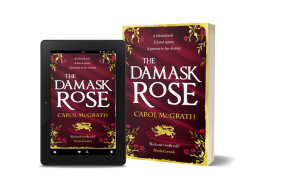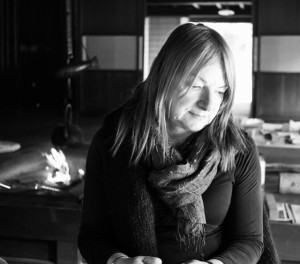It’s a great pleasure to meet author Carol McGrath today, and to welcome her to a spring-like Yorkshire!
Where do you live, Carol?
There is a question! I live in Oxfordshire, England. I also own a house in the Greek Mani which is where I am at the moment.
That sounds – and looks – lie a wonderful place to be at the moment.
Where is your favourite place in the world?
I have to say Donegal in the West of Ireland rates highly though we never bought a holiday house there. The Greek Mani comes close. It’s at the tip of the Peloponnese. Greece is steeped with myth, legends and history. Writers and artists live here so it is inspiring. Some of us over the last few years started up The Mani Literary Festival. Lots of writers want to be part of it. I hope we preserve its character because it is very special. It’s cold here in winter but roasting hot in summer. The best times of year are the Spring and Autumn. The landscape constantly reminds me of Donegal. There’s sea and mountains and much that is of an older world as well as coastal towns with mod cons galore.
I loved Donegal when I visited, too. I can see it being like Greece – only without the sun!
Being a writer is a great job. What’s the worst job you have ever had?
I was a teacher and loved that but none the less ditched it to write. My worst job was working in a San Franciscan Deli where the lunch queue was so fast I had to work incredibly hard to keep up with the sandwich making. It was called The Zasu Pitts Memorial Delicatessen and we had a somewhat temperamental if literary boss who had known many of the ‘beat’ writers such as Jack Kerouac, and the poet, Lawrence Ferlinghetti. I worked there for a year. It wasn’t so terrible really and actually, I guess I have just been lucky with my employment experiences.
That sounds like it could make a great story…
If you could meet anybody dead or alive, who would it be and what would you say to them?
I would like to meet Henry VIII to see what his personality was really like and what his voice sounded like. I guess I might curtsey and say ‘Pleased to meet you, Sire. Please do not take offence by anything I might say. I come from another time so do have empathy for me. I may not know enough to pass as an authentic Tudor woman but the past is a place where you do things differently, as is the future. I am here to understand and learn. But please tell me, did you love any of your wives with all your heart and for herself?’
I expect the chop of course!
It would take a brave person to ask – but I’d love to know the answer, too!
What is your happiest childhood memory?
Donegal holidays and playing on the beach as well as making up stories about smugglers and lights flashing in the mountains behind us at night. We were a happy band of summer friends who ran wild and made our own fun. Summer which was the month of July seemed to last forever. Even wet days were great fun then.
It sounds brilliant. Just like the Famous Five.
If you had to marry a fictional character from books, television or film who would it be?
It could be Dickens’ David Copperfield who had a history, was determined, clever and full of heart. I would learn much first-hand about Victorian society and I would enjoy his company.
What would your Desert Island Disc be?
‘Madam George’ by Van Morrison in Astral Weeks. I played that, ‘Moondance’ and ‘Tupelo Honey’ a lot when I was young. Also, I know the locations for ‘Madam George’ and these being around my University, well, indeed they are very nostalgic reminding me always of Queens University, student days, and my home town, Belfast.
What’s the most important lesson life has taught you?
Question everything. Do not take anything, especially the media today, at face-value.
And finally, please tell us a little about your latest release, and where we can find it.
The Damask Rose
This is the second novel in the She Wolf Queen Trilogy. The first, The Silken Rose, featured Ailenor of Provence. The Damask Rose is mainly about Eleanor of Castile. Her character is off-set by a second heroine, an herbalist called Olwen whose story shows us the lives of ordinary people rather than exclusively focusing on the court. Their stories intersect.
1266. Eleanor of Castile, adored wife of the Crown Prince of England, is still only a princess when she is held hostage in the brutal Baron’s Rebellion, and her baby daughter dies. Scarred by privation, a bitter Eleanor swears revenge on those who would harm her family – and vows never to let herself be vulnerable again.
As she rises to become Queen, Eleanor keeps Olwen – a trusted herbalist, who tried to save her daughter – by her side. But it is dangerous to be friendless in a royal household, and as the court sets out on crusade, Olwen and Eleanor discover that the true battle for Europe may not be a matter of swords and lances, but one fanned by whispers and spies . . .
The Damask Rose Buy Link
Carol McGrath is the author of the acclaimed She-Wolves Trilogy, which began with the hugely successful The Silken Rose and continues with the brand new The Damask Rose. She was born in Northern Ireland, and fell in love with historical fiction at a young age, reading children’s classics and loving historical novels especially Henry Treece, The Children’s Crusade, and, as a teenager, Anya Seton’s Katherine and everything by Jean Plaidy. Visiting the Tower of London and Hampton Court Palace aged eleven was thrilling for her. Exploring Irish castles such as Carrickfergus introduced her to wonderful stories. At only nine years old an archaeological dig in Donegal was inspirational. Carol came away with a few ancient mammal teeth. While completing a degree in history, she became fascinated by the strong women who were silenced in records, and was inspired to start exploring their lives. Her first novel, The Handfasted Wife, was shortlisted for the Romantic Novelists’ Association Awards, and Mistress Cromwell was widely praised as a timely feminist retelling of Tudor court life. Her novels are known for their intricacy, depth of research and powerful stories.
For more news, exclusive content and competitions, sign up to Carol’s newsletter
Follow her on Facebook: /CarolMcGrathAuthor1 and on Twitter: @CarolMcGrath
Thank you, Helena, for interviewing me. It was great fun!
*
Thanks so much for visiting, Carol, and for your thoughtful answers. It’s been lovely getting to know you. The Damask Rose sounds a fascinating novel, and it’s a period of history I know little about. I’m really looking forward to reading it.
If you’ve enjoyed Carol’s interview, or have any questions or comments, please let us know. We’d love to hear from you!




Leave a Reply